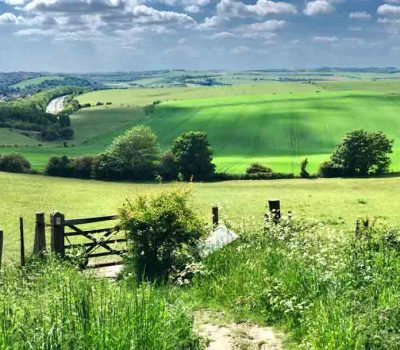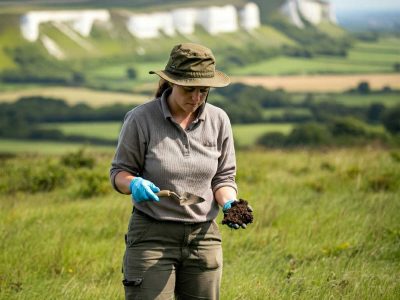Wildflower Seeds for Chalk and Limestone Soils: Locally Sourced Solutions for Flourishing Meadows
Creating a vibrant wildflower meadow on chalk and limestone soils requires a thoughtful selection of seeds and proper preparation. With Wildahome’s locally sourced solutions, you can transform alkaline landscapes into thriving habitats bursting with colour and biodiversity. Let’s explore the characteristics of chalk and limestone soils and how Wildahome’s seeds can help you cultivate flourishing meadows.
Understanding Chalk and Limestone Soils
What Are Chalk and Limestone Soils?
Chalk and limestone soils are found in areas with high calcium carbonate content. These soils form over sedimentary rock and are often free-draining, making them dry and nutrient-poor. The unique conditions of these soils pose challenges for gardeners but also offer exciting opportunities to grow distinctive wildflowers.
Characteristics of Chalky and Alkaline Soils
Chalk and limestone soils are alkaline, with a pH typically above 7.0. They are often shallow and stony, providing excellent drainage but retaining little moisture. These soils warm up quickly in spring but can dry out in summer, requiring plants well-adapted to these extremes. Despite their nutrient limitations, these soils are home to many wildflower species that thrive in their unique conditions.
Why Wildflowers Thrive in Chalk and Limestone Areas
Wildflowers native to chalk and limestone regions have adapted to the soil’s low fertility and dry conditions. Their deep roots anchor them securely in rocky terrain, while their resilience makes them ideal for creating long-lasting meadows. These wildflowers survive and flourish, showcasing various colours and forms.
Choosing the Right Wildflower Seeds for Alkaline Soils
Benefits of Wildflowers for Chalk and Limestone Gardens
Wildflowers enrich gardens by attracting pollinators like bees and butterflies. They stabilise soil, reduce erosion, and create a natural, low-maintenance landscape that changes beautifully with the seasons.
Key Features of Wildflowers Suited to Alkaline Soil Conditions
Wildflowers for chalk and limestone soils often feature vibrant blooms, drought tolerance, and compact growth habits. Their ability to thrive in poor, stony soil conditions makes them ideal for gardens with similar challenges.
The Role of Native Wildflower Species in Alkaline Landscapes
Native species are crucial for supporting local ecosystems. They co-evolved with local pollinators and wildlife, providing essential food and habitat. Using native seeds ensures compatibility with your soil and enhances biodiversity.
Wildahome Wildflower Seeds: Locally Sourced and Sustainable
Why Locally Sourced Seeds Are Best for Your Soil
Locally sourced seeds from Wildahome are perfectly adapted to regional conditions. They promote native biodiversity and have a higher success rate than non-native or imported varieties.

The Environmental Benefits of Supporting Native Seeds
Native seeds reduce the need for fertilisers and water while supporting pollinators and wildlife. By choosing Wildahome’s locally sourced options, you contribute to sustainable gardening and conservation efforts.
How Wildahome Ensures Quality and Compatibility for Chalk and Limestone Soils
Wildahome meticulously curates seed mixes for specific soil types, ensuring compatibility and resilience. Their dedication to quality guarantees seeds that germinate and thrive in alkaline conditions.
Top Wildflower Species for Chalk and Limestone Soils
Best Wildflowers for Dry, Alkaline Meadows
Consider species like Oxeye Daisy, Bird’s-foot Trefoil, and Field Scabious. These sun-loving plants flourish in open meadows and attract a variety of pollinators.
Stunning Wildflowers for Rock Gardens on Chalky Soils
For rock gardens, try Wild Thyme, Harebell, and Clustered Bellflower. These low-growing species add charm and colour to stony, alkaline areas.
Shade-Loving Wildflowers for Limestone Woodland Areas
For shaded limestone woodlands, opt for species like Wood Anemone and Primrose, which thrive under dappled light and bring brightness to forest floors.
Preparing Chalk and Limestone Soils for Wildflower Meadows

Testing and Optimising Soil for Wildflower Planting
Perform a soil test to confirm alkalinity and nutrient levels. Remove existing vegetation and prepare the ground by raking to create a firm seedbed.
Addressing Common Challenges in Alkaline Soil Areas
Challenges like thin soil and poor moisture retention can be mitigated by selecting drought-tolerant wildflower species and avoiding over-enrichment, favouring weeds over wildflowers.
Tips for Improving Soil Structure Without Changing pH
Incorporate organic matter like well-rotted manure or compost sparingly to improve soil structure without altering its natural alkalinity.
How to Plant Wildflower Seeds in Chalk and Limestone Soils
Step-by-Step Guide to Sowing Wildflower Seeds
- Clear the area of weeds and debris.
- Loosen the top layer of soil and firm it down.
- Scatter seeds evenly, mixing them with sand for better distribution.
- Lightly rake and water gently.
Seasonal Planting Tips for Alkaline Soil Success
Plant seeds in autumn or early spring for optimal germination. Autumn sowing allows seeds to establish roots before winter, ensuring robust growth in spring.
Encouraging Germination in Thin or Stony Soils
Water sparingly and keep the soil free of weeds. Seeds adapted to chalk and limestone soils will germinate naturally with minimal intervention.
The Benefits of Wildflower Meadows in Chalk and Limestone Areas
Supporting Pollinators in Alkaline Environments
Wildflower meadows attract bees, butterflies, and other pollinators, providing them with vital nectar sources and nesting habitats.
Enhancing Local Biodiversity with Wildahome Seeds
Wildahome’s seed mixes foster a rich tapestry of plants, insects, and wildlife, turning barren landscapes into vibrant ecosystems.
Transforming Challenging Soils into Thriving Habitats
You can create stunning and sustainable meadows by harnessing the natural potential of chalk and limestone soils.
Why Wildahome Is Your Trusted Source for Wildflower Seeds
Commitment to Local Sourcing and Biodiversity
Wildahome prioritises local seed sourcing to support native ecosystems and ensure the best match for your soil type.

How Wildahome Tailors Seeds for Your Specific Soil Type
Each seed mix is carefully tailored to thrive in specific conditions, from thin, rocky soils to shaded limestone woodlands.
Customer Success Stories: Wildflowers Flourishing in Chalk and Limestone Gardens
Wildahome customers rave about their transformed gardens, showcasing vibrant meadows where challenging soils once prevailed.
FAQs About Growing Wildflowers on Chalk and Limestone Soils
Can Wildflowers Grow in Very Thin or Rocky Soil?
Yes, many wildflowers are well-suited to thin, stony soils. Wildahome’s seed mixes are designed to thrive in such conditions.
Are Wildahome Seeds Suitable for Beginners?
Absolutely. With clear instructions and high-quality seeds, Wildahome makes wildflower gardening accessible to all.
How Long Does It Take for Wildflowers to Establish in Chalky Areas?
Wildflowers typically begin to bloom within their first year, with the entire establishment achieved by the second year.
Do Wildflower Meadows Require Ongoing Maintenance?
Wildflower meadows are low-maintenance compared to traditional lawns, but some care is needed. Mow the meadow yearly after flowering to encourage reseeding and remove invasive weeds to preserve biodiversity.
Can Wildflowers Grow in Full Sun on Chalky Soils?
Yes, many wildflowers adapted to chalky soils thrive in full sun. Species like Oxeye Daisy and Bird’s-foot Trefoil are perfect for sunny, open areas.
Are Wildflower Seeds Safe for Pets and Wildlife?
Wildahome’s wildflower seeds are natural and safe for pets and wildlife. They also create habitats that support birds, bees, and butterflies.
How Do I Prevent Weeds from Overtaking My Wildflower Meadow?
Prepare the soil thoroughly before sowing to remove existing weeds. After establishment, annual mowing and spot removal of aggressive plants will help maintain a healthy meadow.
Wildahome for Locally Sourced Wildflower Seeds for Chalk & Limestone Soils
With Wildahome’s unparalleled expertise and a diverse range of locally sourced wildflower seeds, creating a thriving and biodiverse meadow on chalk and limestone soils is now more accessible than ever.
From small personal garden projects to expansive farm meadow restorations, Wildahome is here to support every endeavour. Whether working on a community initiative to bring nature back to shared spaces or embarking on a construction project striving for a net gain in biodiversity, Wildahome empowers you to transform even the most challenging terrains into vibrant ecosystems brimming with life.
Whether you’re an experienced gardener looking to refine your craft or a beginner taking the first steps in meadow creation, Wildahome’s guidance ensures success at every scale, helping turn your vision into a blossoming reality.

